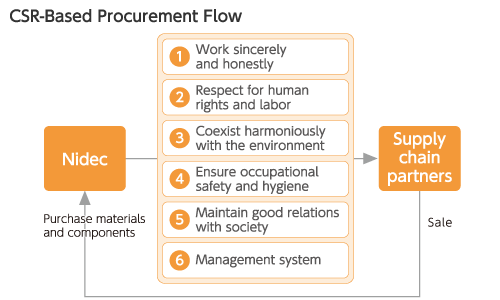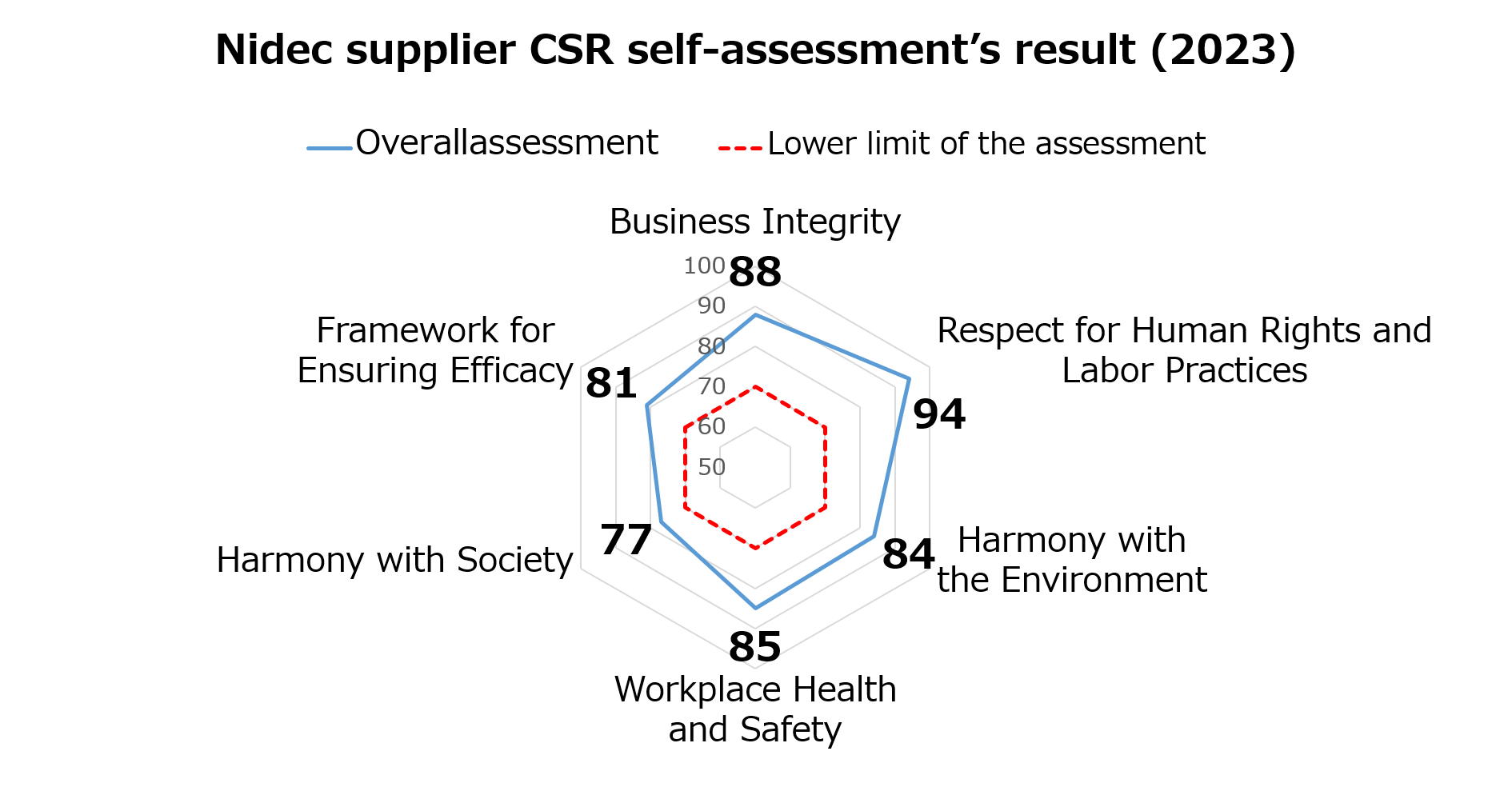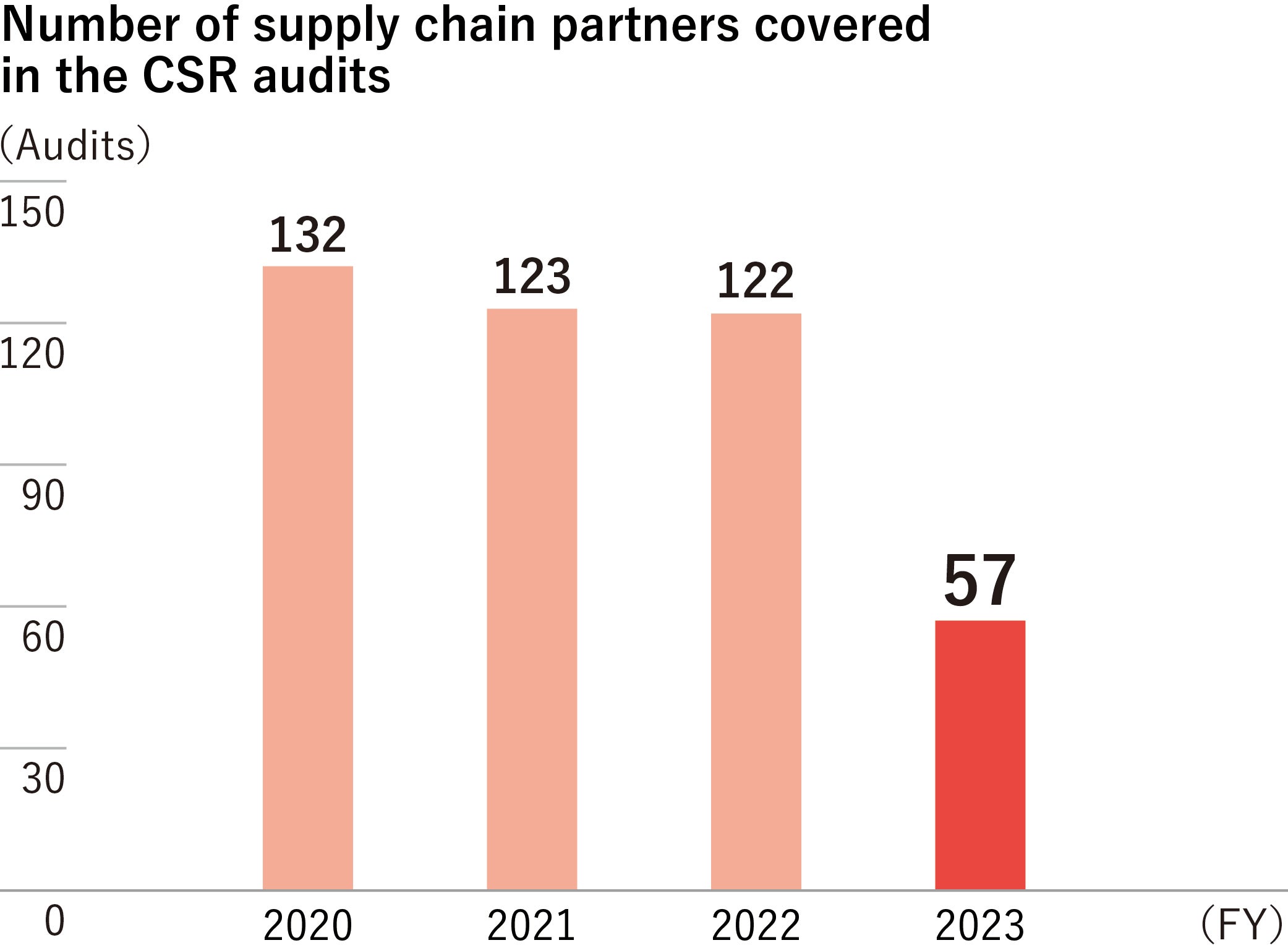Supply Chain Management
Supplier Relations
Basic stance
Supply chains are linked to many social issues. Companies need to conduct business while considering the impact on the environment and society as a whole, not just their own profits. If social or environmental risks in the supply chain are uncovered, such as when the rights or safety of workers at suppliers are not being protected, or when the raw materials used in procured goods are linked to environmental destruction, this can lead to a slowdown in the procurement of raw materials and parts, and damage the sustainability of the company’s supply chain, which in turn could affect the company’s ability to continue its business. Furthermore, the lack of transparency and risk management in the entire supply chain may be exposed, damaging the company’s reputation and credibility, and there is a risk of consumer boycotts and social criticism.
Working in collaboration with its suppliers, the Nidec Group promotes CSR activities throughout the entire supply chain. As part of such efforts, the “Nidec Group Supply Chain CSR Promotion Guidebook” and the Nidec Group’s Basic Policy on Human Rights, which provide more specific standards established in line with the pillars of the CSR Charter, are rolled out to all suppliers. To ensure that suppliers also fulfill their social responsibilities, we require our suppliers to comply with the “Nidec Group Supply Chain CSR Promotion Guidebook” in our basic purchasing agreement.
We will continue to engage in procurement activities that take into consideration both social aspects, such as prohibition of child and forced labor and reduction of long working hours, and environmental aspects, such as energy consumption, biodiversity, and waste/resource use at suppliers. We ask our suppliers for their continued cooperation.

Target
Materiality

Systems and actions
The Nidec Group, which produces products in various countries in the world, has globally diverse supply chains. To fulfill its social responsibilities in these business activities, the Nidec Group assesses risks (including environmental and social issues) of, and audits, its supply chain partners. The NIDEC Group Supply-Chain CSR Promotion Guidebook and NIDEC Group Human Rights Policies set out the policies and standards for building a sustainable supply chain, and these are being rolled out to all global suppliers. We also stipulate compliance with these policies and standards in our basic purchasing contracts. In addition, in order to conduct due diligence on potential new suppliers, we always request that suppliers with whom we are starting new transactions respond to the NIDEC Supplier CSR Self-Assessment and conduct risk assessments of social issues
NIDEC Group Supply-Chain CSR Promotion Guidebook
Example1 Clarified policy on reducing excessive working hours
- Suppliers shall comply with all applicable wage and hour laws and regulations, including those relating to minimum wages, overtime, and maximum hours. Further, Suppliers are encouraged to implement corrective measures in situations where the number of hours worked by employees, including overtime, repeatedly exceeds 60 hours per week.
- Unless otherwise provided by applicable local law, Suppliers shall provide all employees with a minimum of one day off per week or every seven day period. This rest period must be in addition to any annual leave provided under national legislation and practice.
Example2 Commitment to exceeding the minimum wage in the region / meeting the cost of living
- Suppliers shall ensure that compensation paid to employees complies with all applicable wage laws, including those relating to minimum wages, overtime pay and legally mandated benefits. Illegal, unjustified wage deductions as a disciplinary measure shall not be permitted.
- For each pay period, employees shall be provided with a wage statement that includes sufficient information to verify accurate compensation for work performed.
Nidec Supplier CSR Self-assessment
Starting from FY2018, we have conducted the Nidec supplier CSR self-assessment to understand the status of CSR procurement and have our supply chain partners report on the status of their implementation of the Nidec Group Supply Chain CSR Promotion Guidebook and the Nidec Group’s Basic Policy on Human Rights. The areas of survey are based on the Guidebook’s Chapters 1 - 6, to assess the status of individual supply chain partners based on a total of 111 sections. Regardless of whether the evaluation is high or low, feedback, etc. is provided to all suppliers to encourage further improvement. At the Nidec Group, we select important suppliers from among our supply chain partners by taking into account their volume of business transactions with us, critical components, technological capability to develop products, substitutability, compliance management, and all other required elements. We request those individual selected important suppliers and others, i.e., the companies that occupy approximately 80% of the purchased amounts of Nidec’s individual business departments and group companies, to submit the results of their self-assessment. In the supplier CSR self-assessment conducted in July 2023, 876 suppliers of Nidec Corporation and other member companies of the Nidec Group headquartered in Japan submitted to us the results of their self-assessment.
| 2021 | 2022 | 2023 | |
|---|---|---|---|
| The number of suppliers that conducted a Nidec supplier CSR self-assessment | 667 | 732 | 876 |
The results of the self-assessment revealed that the CSR activities of our entire supply chains are above our standard. Going forward, to check for a gap between the self-assessment’s results and reality, we are planning to conduct an onsite audit at our supply chain partners as necessary. Through continuous communications with our supply chain partners, we will ensure a proper self-assessment and further improvement of CSR activities throughout the supply chains.

CSR audit of supply chain partners
Since FY2010, the Nidec Group has been auditing our main supply chain partners* on-site. During FY2023, the Nidec Group audited 57 of its supply chain partners onsite in Asia and other regions.
*main supply chain partners: Suppliers that frequently visit a Nidec company’s property. They include indirect material (e.g. cardboard box, adhesive, grease, packing tape, and pallet) dealers, equipment manufacturers, contractors that enter company-owned dormitories (food suppliers, security personnel, etc.) and temporary staff agencies.

To ensure that all of its supply chain partners understand our CSR, Nidec Electronics (Thailand) Co., Ltd. has in place a system to explain the RBA* (Responsible Business Alliance) to its partners, and to allow any supply chain partner wishing to inquire or consult on Nidec's CSR activities to e-mail the company's contact person. Nidec Electronics (Thailand) Co., Ltd. also held presentation meetings on CSR procurement for its major supply chain partners, and audits them onsite based on the results of advance survey sheets. Since FY2013, our CSR audit standard has been based on the RBA, and companies to be audited, mainly new supply chain partners, are selected based on the standard. In FY2022, we launched activities with the target of requesting 27 of our supply chain partners to comply with the CSR audit standard. Nidec Electronics (Thailand) Co., Ltd. thus supports and instructs its supply chain partners to enable them to engage in CSR activities based on their circumstances.
In another example, Nidec Philippines Corporation, focused on the CSR audits for its new supply chain partners, requested them to submit a status report on an improvement plan and corrective actions, and launch those corrective actions if those partners had any issue identified in such areas as the environment, labor, health and safety, and management system.
*Responsible Business Alliance (RBA) (former Electronic Industry Citizenship Coalition: EICC): The RBA, renamed from the EICC in October 2017, is an organization established with the aim of resolving social, environmental and ethical issues in supply chains. The RBA Code of Conduct established referencing major internationally recognized norms and standards focuses on the following aspects: respect for human rights, improvement of the working environment, assurance of safety and health, environmental conservation, establishment of corporate ethics, and improvement of management systems.
CSR seminar for purchasing personnel
As Nidec promotes CSR activities throughout its supply chain, it is important for our procurement personnel to understand Nidec's CSR policies first. Since the fiscal year of 2018, Nidec Corporation and other members of the Nidec Group in Japan have been holding CSR seminars for purchasing personnel based on the Nidec Group Supply-Chain CSR Promotion Guidebook. In the fiscal year of 2022, we revised the contents of the seminars and discussed our plan for them going forward, to conduct human rights due diligence on our main suppliers by 2025. In FY2023, the number of employees who participated in the CSR seminar increased significantly as the scope of the program was expanded to include employees in departments other than purchasing (such as development, production, and quality assurance departments).
| FY2021 | FY2022 | FY2023 | |
|---|---|---|---|
| The number of employees who participated in the CSR seminar for purchasing personnel | 250 | - | 1,300 |

Following the rules on disclosing information on “conflict minerals”
The mineral resources produced in Africa’s Democratic Republic of the Congo and its neighboring countries (collectively, the “DRC Countries”*) are critical as materials for producing electronic components. However, these minerals are traded to fund local armed forces, promoting various inhumane acts.
In the light of these circumstances, in the Dodd-Frank Wall Street Reform and Consumer Protection Act enacted in July 2010, the US government defined as “conflict minerals” the four minerals tantalum, tin, gold, and tungsten, and finalized the policy of maintaining transparency in trading those minerals, to disrupt the financial flow to the DRC Countries’ armed forces. Nidec, in agreement with the objective of the Act, finalized a policy of not using the four minerals which have been linked to the armed forces, and disclosed the policy on its website in 2011. It works with its customers and supply chain partners to ensure that minerals whose trading may fund conflicts will not be used in our company’s products.
*The DRC Countries are: the Democratic Republic of the Congo, the Republic of the Congo, the Central African Republic, the Republic of South Sudan, the Republic of Zambia, the Republic of Angola, the United Republic of Tanzania, the Republic of Burundi, the Republic of Rwanda, and the Republic of Uganda (according to Article 1502 of the Dodd-Frank Wall Street Reform and Consumer Protection Act).
Basic Procurement Policy - No conflict minerals
The U.S Securities and Exchange Commission (SEC) Filings
Form SD & Conflict Minerals Report (2015)
Form SD & Conflict Minerals Report (2014)
Form SD & Conflict Minerals Report (2013)
*After delisting its stocks from the New York Stock Exchange in May 2016, Nidec has not made any of the above SEC filings since 2016.
UK Modern Slavery Act Statement
Nidec publishes “Slavery and Human Trafficking Statement” in response to UK Modern Slavery Act 2015. Please refer to the attached statement.
*The UK Modern Slavery Act:
The Act requires any commercial organisation, including manufacturers carrying on a business or part of a business in the UK, which supplies goods and/or services and which has an annual turnover in excess of £36 million, to disclose information regarding its policies and the steps it has taken to eradicate slavery and human trafficking within its own business and from its supply chain.
